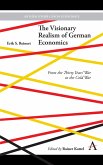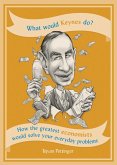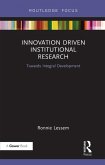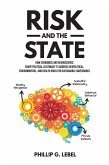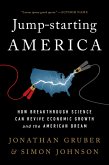Erik S. ReinertFrom the Thirty Years' War to the Cold War
The Visionary Realism of German Economics (eBook, ePUB)
From the Thirty Years' War to the Cold War
Redaktion: Kattel, Rainer
33,95 €
33,95 €
inkl. MwSt.
Sofort per Download lieferbar

17 °P sammeln
33,95 €
Als Download kaufen

33,95 €
inkl. MwSt.
Sofort per Download lieferbar

17 °P sammeln
Jetzt verschenken
Alle Infos zum eBook verschenken
33,95 €
inkl. MwSt.
Sofort per Download lieferbar
Alle Infos zum eBook verschenken

17 °P sammeln
Erik S. ReinertFrom the Thirty Years' War to the Cold War
The Visionary Realism of German Economics (eBook, ePUB)
From the Thirty Years' War to the Cold War
Redaktion: Kattel, Rainer
- Format: ePub
- Merkliste
- Auf die Merkliste
- Bewerten Bewerten
- Teilen
- Produkt teilen
- Produkterinnerung
- Produkterinnerung

Bitte loggen Sie sich zunächst in Ihr Kundenkonto ein oder registrieren Sie sich bei
bücher.de, um das eBook-Abo tolino select nutzen zu können.
Hier können Sie sich einloggen
Hier können Sie sich einloggen
Sie sind bereits eingeloggt. Klicken Sie auf 2. tolino select Abo, um fortzufahren.

Bitte loggen Sie sich zunächst in Ihr Kundenkonto ein oder registrieren Sie sich bei bücher.de, um das eBook-Abo tolino select nutzen zu können.
The Visionary Realism of German Economics forms a collection of Erik S. Reinert's essays bringing the more realistic German economic tradition into focus as an alternative to Anglo-Saxon neoclassical mainstream economics. Together the essays form a holistic theory explaining why economic development-by its very nature-is a very uneven process. Herein lie the important policy implications of the volume.
- Geräte: eReader
- mit Kopierschutz
- eBook Hilfe
- Größe: 3.97MB
Andere Kunden interessierten sich auch für
![The Visionary Realism of German Economics (eBook, PDF) The Visionary Realism of German Economics (eBook, PDF)]() Erik S. ReinertThe Visionary Realism of German Economics (eBook, PDF)33,95 €
Erik S. ReinertThe Visionary Realism of German Economics (eBook, PDF)33,95 €![What Would Keynes Do? (eBook, ePUB) What Would Keynes Do? (eBook, ePUB)]() Tejvan PettingerWhat Would Keynes Do? (eBook, ePUB)3,99 €
Tejvan PettingerWhat Would Keynes Do? (eBook, ePUB)3,99 €![Innovation Driven Institutional Research (eBook, ePUB) Innovation Driven Institutional Research (eBook, ePUB)]() Ronnie LessemInnovation Driven Institutional Research (eBook, ePUB)21,95 €
Ronnie LessemInnovation Driven Institutional Research (eBook, ePUB)21,95 €![The Learning Economy and the Economics of Hope (eBook, ePUB) The Learning Economy and the Economics of Hope (eBook, ePUB)]() Bengt-Åke LundvallThe Learning Economy and the Economics of Hope (eBook, ePUB)0,00 €
Bengt-Åke LundvallThe Learning Economy and the Economics of Hope (eBook, ePUB)0,00 €![The Space Industry of the Future (eBook, ePUB) The Space Industry of the Future (eBook, ePUB)]() Mark W. McElroy JrThe Space Industry of the Future (eBook, ePUB)57,95 €
Mark W. McElroy JrThe Space Industry of the Future (eBook, ePUB)57,95 €![Risk and the State (eBook, ePUB) Risk and the State (eBook, ePUB)]() Phillip G. LebelRisk and the State (eBook, ePUB)26,95 €
Phillip G. LebelRisk and the State (eBook, ePUB)26,95 €![Jump-Starting America (eBook, ePUB) Jump-Starting America (eBook, ePUB)]() Jonathan GruberJump-Starting America (eBook, ePUB)10,99 €
Jonathan GruberJump-Starting America (eBook, ePUB)10,99 €-
-
-
The Visionary Realism of German Economics forms a collection of Erik S. Reinert's essays bringing the more realistic German economic tradition into focus as an alternative to Anglo-Saxon neoclassical mainstream economics. Together the essays form a holistic theory explaining why economic development-by its very nature-is a very uneven process. Herein lie the important policy implications of the volume.
Dieser Download kann aus rechtlichen Gründen nur mit Rechnungsadresse in A, D ausgeliefert werden.
Produktdetails
- Produktdetails
- Verlag: Anthem Press
- Erscheinungstermin: 15. Februar 2019
- Englisch
- ISBN-13: 9781783089055
- Artikelnr.: 56828034
- Verlag: Anthem Press
- Erscheinungstermin: 15. Februar 2019
- Englisch
- ISBN-13: 9781783089055
- Artikelnr.: 56828034
- Herstellerkennzeichnung Die Herstellerinformationen sind derzeit nicht verfügbar.
Erik S. Reinert is Professor of Technology Governance and Development Strategies at Tallinn University of Technology, Estonia, and also Chairman of the Other Canon Foundation in Norway. He holds a BA from Hochschule St. Gallen, Switzerland, an MBA from Harvard University, and a PhD in economics from Cornell University. For almost 20 years he ran a manufacturing company producing in three European countries. This background brought Reinert close to economics as a "science of practice" (Erfahrungswissenschaft). Lecturing in five languages, Reinert's work has taken him to more than 65 different countries. His book How Rich Countries Got Rich ... and Why Poor Countries Stay Poor, published in more than 20 languages, was shortlisted by the World Economics Association in 2016 for inclusion among the 10 most important economics books of the last 100 years.
Introduction; Chapter 1 German Economics as Development Economics: From the
Thirty Years' War to World War II; Chapter 2 The Role of the State in
Economic Growth; Chapter 3 A Brief Introduction to Veit Ludwig von
Seckendorff (1626- 1692); Chapter 4 Exploring the Genesis of Economic
Innovations: The Religious Gestalt- Switch and the Duty to Invent as
Preconditions for Economic Growth (with Arno Daastøl); Chapter 5 Johann
Heinrich Gottlob von Justi (1717- 1771): The Life and Times of an Economist
Adventurer; Chapter 6 Jacob Bielfeld's "On the Decline of States" (1760)
and Its Relevance for Today; Chapter 7 Raw Materials in the History of
Economic Policy; or, Why List (the Protectionist) and Cobden (the Free
Trader) Both Agreed on Free Trade in Corn; Chapter 8 Compensation
Mechanisms and Targeted Economic Growth: Lessons from the History of
Economic Policy; Chapter 9 Karl Bücher and the Geographical Dimensions of
Techno- Economic Change: Production- Based Economic Theory and the Stages
of Economic Development; Chapter 10 Austrian Economics and the Other Canon:
The Austrians between the Activistic- Idealistic and the Passivistic-
Materialistic Traditions of Economics; Chapter 11 Nietzsche and the German
Historical School of Economics (with Sophus A. Reinert); Chapter 12
Creative Destruction in Economics: Nietzsche, Sombart, Schumpeter (with
Hugo Reinert); Chapter 13 Schumpeter in the Context of Two Canons of
Economic Thought; Chapter 14 The Role of Technology in the Creation of Rich
and Poor Nations: Underdevelopment in a Schumpeterian System; Chapter 15
Towards an Austro-German Theory of Uneven Economic Development? A Plea for
Theorising by Inclusion; Chapter 16 The Qualitative Shift in European
Integration: Towards Permanent Wage Pressures and a 'Latin-
Americanization' of Europe? (with Rainer Kattel); Chapter 17
Primitivization of the EU Periphery: The Loss of Relevant Knowledge;
Chapter 18 Mechanisms of Financial Crises in Growth and Collapse:
Hammurabi, Schumpeter, Perez, and Minsky; Chapter 19 Full Circle: Economics
from Scholasticism through Innovation and Back into Mathematical
Scholasticism: Reflections on a 1769 Price Essay: "Why Is It That Economics
So Far Has Gained So Few Advantages from Physics and Mathematics?"; Chapter
20 Werner Sombart (1863-1941) and the Swan Song of German Economics; Index.
Thirty Years' War to World War II; Chapter 2 The Role of the State in
Economic Growth; Chapter 3 A Brief Introduction to Veit Ludwig von
Seckendorff (1626- 1692); Chapter 4 Exploring the Genesis of Economic
Innovations: The Religious Gestalt- Switch and the Duty to Invent as
Preconditions for Economic Growth (with Arno Daastøl); Chapter 5 Johann
Heinrich Gottlob von Justi (1717- 1771): The Life and Times of an Economist
Adventurer; Chapter 6 Jacob Bielfeld's "On the Decline of States" (1760)
and Its Relevance for Today; Chapter 7 Raw Materials in the History of
Economic Policy; or, Why List (the Protectionist) and Cobden (the Free
Trader) Both Agreed on Free Trade in Corn; Chapter 8 Compensation
Mechanisms and Targeted Economic Growth: Lessons from the History of
Economic Policy; Chapter 9 Karl Bücher and the Geographical Dimensions of
Techno- Economic Change: Production- Based Economic Theory and the Stages
of Economic Development; Chapter 10 Austrian Economics and the Other Canon:
The Austrians between the Activistic- Idealistic and the Passivistic-
Materialistic Traditions of Economics; Chapter 11 Nietzsche and the German
Historical School of Economics (with Sophus A. Reinert); Chapter 12
Creative Destruction in Economics: Nietzsche, Sombart, Schumpeter (with
Hugo Reinert); Chapter 13 Schumpeter in the Context of Two Canons of
Economic Thought; Chapter 14 The Role of Technology in the Creation of Rich
and Poor Nations: Underdevelopment in a Schumpeterian System; Chapter 15
Towards an Austro-German Theory of Uneven Economic Development? A Plea for
Theorising by Inclusion; Chapter 16 The Qualitative Shift in European
Integration: Towards Permanent Wage Pressures and a 'Latin-
Americanization' of Europe? (with Rainer Kattel); Chapter 17
Primitivization of the EU Periphery: The Loss of Relevant Knowledge;
Chapter 18 Mechanisms of Financial Crises in Growth and Collapse:
Hammurabi, Schumpeter, Perez, and Minsky; Chapter 19 Full Circle: Economics
from Scholasticism through Innovation and Back into Mathematical
Scholasticism: Reflections on a 1769 Price Essay: "Why Is It That Economics
So Far Has Gained So Few Advantages from Physics and Mathematics?"; Chapter
20 Werner Sombart (1863-1941) and the Swan Song of German Economics; Index.
Introduction; Chapter 1 German Economics as Development Economics: From the
Thirty Years' War to World War II; Chapter 2 The Role of the State in
Economic Growth; Chapter 3 A Brief Introduction to Veit Ludwig von
Seckendorff (1626- 1692); Chapter 4 Exploring the Genesis of Economic
Innovations: The Religious Gestalt- Switch and the Duty to Invent as
Preconditions for Economic Growth (with Arno Daastøl); Chapter 5 Johann
Heinrich Gottlob von Justi (1717- 1771): The Life and Times of an Economist
Adventurer; Chapter 6 Jacob Bielfeld's "On the Decline of States" (1760)
and Its Relevance for Today; Chapter 7 Raw Materials in the History of
Economic Policy; or, Why List (the Protectionist) and Cobden (the Free
Trader) Both Agreed on Free Trade in Corn; Chapter 8 Compensation
Mechanisms and Targeted Economic Growth: Lessons from the History of
Economic Policy; Chapter 9 Karl Bücher and the Geographical Dimensions of
Techno- Economic Change: Production- Based Economic Theory and the Stages
of Economic Development; Chapter 10 Austrian Economics and the Other Canon:
The Austrians between the Activistic- Idealistic and the Passivistic-
Materialistic Traditions of Economics; Chapter 11 Nietzsche and the German
Historical School of Economics (with Sophus A. Reinert); Chapter 12
Creative Destruction in Economics: Nietzsche, Sombart, Schumpeter (with
Hugo Reinert); Chapter 13 Schumpeter in the Context of Two Canons of
Economic Thought; Chapter 14 The Role of Technology in the Creation of Rich
and Poor Nations: Underdevelopment in a Schumpeterian System; Chapter 15
Towards an Austro-German Theory of Uneven Economic Development? A Plea for
Theorising by Inclusion; Chapter 16 The Qualitative Shift in European
Integration: Towards Permanent Wage Pressures and a 'Latin-
Americanization' of Europe? (with Rainer Kattel); Chapter 17
Primitivization of the EU Periphery: The Loss of Relevant Knowledge;
Chapter 18 Mechanisms of Financial Crises in Growth and Collapse:
Hammurabi, Schumpeter, Perez, and Minsky; Chapter 19 Full Circle: Economics
from Scholasticism through Innovation and Back into Mathematical
Scholasticism: Reflections on a 1769 Price Essay: "Why Is It That Economics
So Far Has Gained So Few Advantages from Physics and Mathematics?"; Chapter
20 Werner Sombart (1863-1941) and the Swan Song of German Economics; Index.
Thirty Years' War to World War II; Chapter 2 The Role of the State in
Economic Growth; Chapter 3 A Brief Introduction to Veit Ludwig von
Seckendorff (1626- 1692); Chapter 4 Exploring the Genesis of Economic
Innovations: The Religious Gestalt- Switch and the Duty to Invent as
Preconditions for Economic Growth (with Arno Daastøl); Chapter 5 Johann
Heinrich Gottlob von Justi (1717- 1771): The Life and Times of an Economist
Adventurer; Chapter 6 Jacob Bielfeld's "On the Decline of States" (1760)
and Its Relevance for Today; Chapter 7 Raw Materials in the History of
Economic Policy; or, Why List (the Protectionist) and Cobden (the Free
Trader) Both Agreed on Free Trade in Corn; Chapter 8 Compensation
Mechanisms and Targeted Economic Growth: Lessons from the History of
Economic Policy; Chapter 9 Karl Bücher and the Geographical Dimensions of
Techno- Economic Change: Production- Based Economic Theory and the Stages
of Economic Development; Chapter 10 Austrian Economics and the Other Canon:
The Austrians between the Activistic- Idealistic and the Passivistic-
Materialistic Traditions of Economics; Chapter 11 Nietzsche and the German
Historical School of Economics (with Sophus A. Reinert); Chapter 12
Creative Destruction in Economics: Nietzsche, Sombart, Schumpeter (with
Hugo Reinert); Chapter 13 Schumpeter in the Context of Two Canons of
Economic Thought; Chapter 14 The Role of Technology in the Creation of Rich
and Poor Nations: Underdevelopment in a Schumpeterian System; Chapter 15
Towards an Austro-German Theory of Uneven Economic Development? A Plea for
Theorising by Inclusion; Chapter 16 The Qualitative Shift in European
Integration: Towards Permanent Wage Pressures and a 'Latin-
Americanization' of Europe? (with Rainer Kattel); Chapter 17
Primitivization of the EU Periphery: The Loss of Relevant Knowledge;
Chapter 18 Mechanisms of Financial Crises in Growth and Collapse:
Hammurabi, Schumpeter, Perez, and Minsky; Chapter 19 Full Circle: Economics
from Scholasticism through Innovation and Back into Mathematical
Scholasticism: Reflections on a 1769 Price Essay: "Why Is It That Economics
So Far Has Gained So Few Advantages from Physics and Mathematics?"; Chapter
20 Werner Sombart (1863-1941) and the Swan Song of German Economics; Index.

